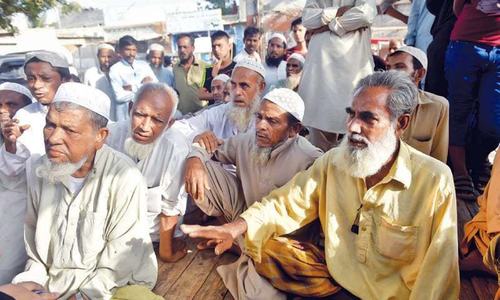KARACHI: Unlike nearly a million Rohingya Muslims living in shelter camps in Bangladesh, Noor Ahmed, 55, lodges in a huge house in a middle-income neighborhood of the eastern district of Karachi.
He is one of the hundreds of thousands of Rohingya Muslims — often referred to as Burmese — who have made Karachi their home over the past several years. However, contrary to a majority of his countrymen who have been living in impoverished conditions even by Karachi’s standard, Ahmed manages a roaring business.
Sitting in his jewellery store in the middle-income ‘Burma Colony’ locality, which is one of the two main Rohingya settlements in Karachi, Ahmed narrates his success story.
“I migrated to Pakistan via Bangladesh and India after a gruelling journey in 1982 with a group of Rohingya. I was the only one who migrated and settled in Karachi at that time,” he recalls while talking to Anadolu Agency.
His parents and two younger brothers and a sister reunited with him a couple of years later.
Young Rohingyas, especially girls, are increasingly getting themselves enrolled in educational institutions
Like most of the Rohingya immigrants, Ahmed initially worked as a labourer in a fishery company but soon found a job at a small jewellery shop, where he worked for next seven years, working his way up to sales assistantship.
“I started my own [jewellery] business in partnership with a friend in a portion of a shop in 1992. I still remember that in the first month, we earned a mere Rs2,000 profit,” Ahmed says, recalling the initial hard times, which also led to his business partner’s withdrawal.
“There had been several ups and downs, including a time when I almost defaulted. But I did not lose hope and continued to struggle,” he explains, adding his business started to flourish after five tough years.
Today, Ahmed owns a business not only in Pakistan but also in Saudi Arabia and the United Arab Emirates.
Born and raised in Karachi, Mohammad Ibrahim, 39, who has recently been promoted as an assistant professor at a local college, is another success story. His parents had migrated to Karachi in the 1970s.
“My parents worked hard and made me go to school, and then college and university, unlike many other children who simply worked to add to their parents’ income,” he says.
Ibrahim completed a Masters degree in Islamic Studies from the University of Karachi, and was appointed a lecturer at a college after he cleared the government service examination in 2005.
The Rohingya, described by the UN as among the world’s most persecuted people, have faced heightened fear of attacks since dozens were killed in communal violence in 2012.
They are now facing a threat of forced repatriation by the Bangladeshi government despite no citizenship rights and safety guarantees from a defiant Myanmar government.
No official status
Ahmed and Ibrahim refused to get their pictures taken.
“Officially, I am not a Rohingya, but a Bengali,” Ahmed says with a smile.
“In fact, you will not officially find any Rohingya here [Pakistan]. They all dub themselves as Bengalis [who migrated or opted to stay in Pakistan after creation of Bangladesh in 1971] to get citizenship, jobs and other benefits,” he claims.
Rohingya, who came to Pakistan between 1971 and 1980, were granted citizenship along with other communities that migrated from Bangladesh. After 1980, the government blocked citizenship for them though some managed to gain identity cards and passports by bribing officials.
“Being Rohingya means nothing to immigration authorities. There is no word Rohingya in their dictionary,” says Qari Mohammad Saleh, general secretary of the Karachi-based Rohingya Solidarity Organisation (RSO), echoing Ahmed’s words.
“We are advised by the officials — in good faith — to introduce ourselves as Bengali rather than Rohingya if we want to get passports and identification cards,” says Qari Saleh, who migrated to Pakistan in 1985.
Frequent media visits since 2017 have led the community to be even more conscious against pushback towards their nationality.
“Portrayal of Rohingya as illegal immigrants by several media outlets has alarmed them. They no longer introduce themselves as Rohingya,” he adds.
Ethnic tensions in Sindh have also led to tight immigration scrutiny as many local Sindhis accuse Afghan, Bengali, and Rohingya immigrants of disturbing the province’s ethnic equilibrium.
Karachi is home to more than 400,000 Rohingya Muslims, the highest number after Myanmar and now Bangladesh, unofficial estimates suggest.
“We do not have exact figures because in the census we are counted as Bengalis. Therefore, we do not know the exact figures of Rohingya in Pakistan,” Saleh maintains.
Young Rohingya, especially girls, have inclined to pursue their education in recent years, even from poor families.
Educational trusts comprising local traders and rich community members are running several schools and vocational centres in both settlements.
Al-Khidmat Foundation — the relief wing of Jamaat-i-Islami — is also running a school, and other relief projects in impoverished Arkanabad.
“Not only has the younger generation but their uneducated parents also have recognised the importance of education during the last one decade,” says Noorul Bashar, the principal of Arakan Muslim Secondary School in Burma Colony.
Some 800 students, 60 per cent of them girls, have been enrolled in the school. Several former students of the school are currently serving in banks, educational institutes and armed forces.
“We do not want to indulge in any ethnic argument. Despite having a [Rohingya] background, we are citizens of Pakistan and are serving for its betterment like any other community,” says the principal who has been running the school for over 40 years.
“My mission is to educate my community. This is the only way to elevate their status. Mere complaints and sympathy-seeking won’t work.”
Published in Dawn, August 25th, 2019















































